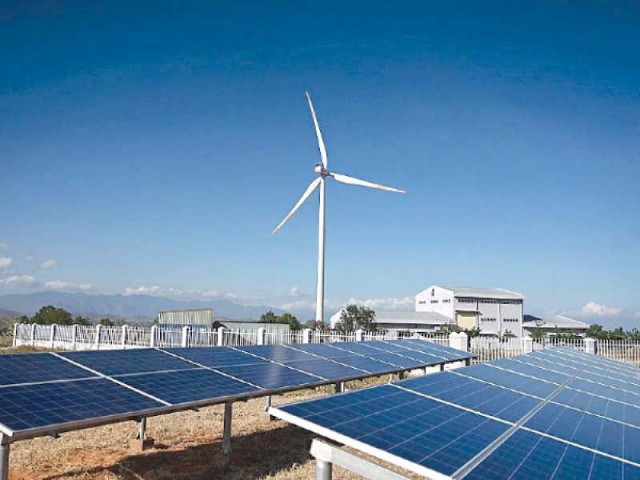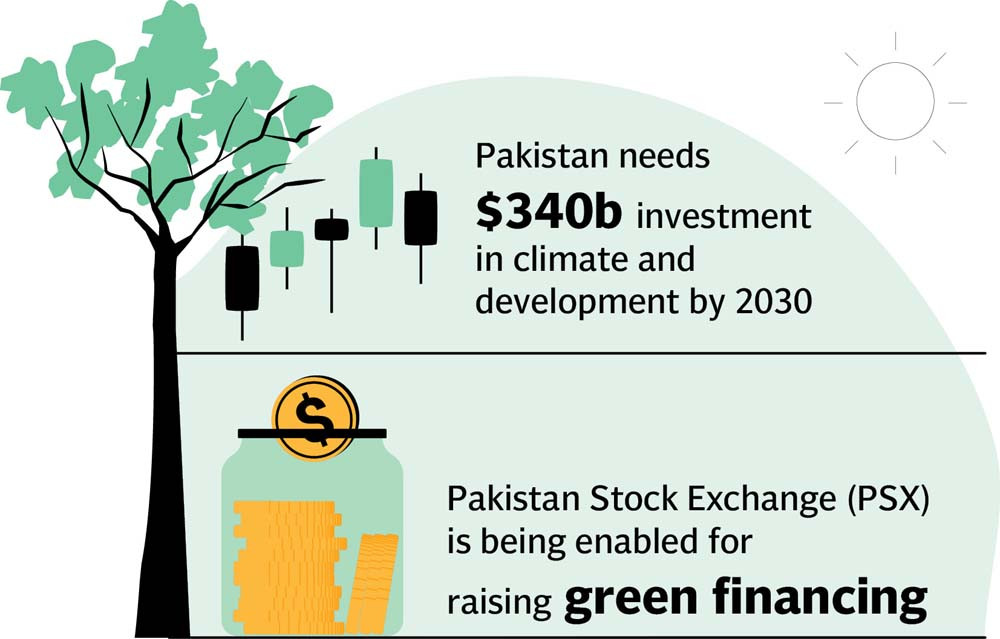$340b needed to fight climate change
Akhtar says plan prepared to tackle issues, enable PSX to raise green financing

Pakistan faces a monumental task in its battle against climate change, requiring a massive investment of $340 billion over the next seven years to confront the escalating threats of rising temperatures and sea levels. The nation’s fate, as well as its exports to the world, hangs in the balance.
As the government gears up for the forthcoming COP meeting, it is confronted with the slow fulfilment of financial commitments made by multilateral and bilateral donors, worth approximately $10 billion and agreed upon in Geneva in January 2023. Notably, this has prompted the finance ministry and the climate ministry to collaborate for the first time in history.
During the second Pakistan Climate Conference 2023, organised by the Overseas Investors Chamber of Commerce and Industry (OICCI), Finance Minister Dr Shamshad Akhtar emphasised the government’s decision not to tap international commercial markets to secure the necessary funding. This decision was driven by the current exorbitant cost of borrowing.
Nevertheless, the government has launched its ground-breaking “National Adaptation Plan” to address climate challenges, alongside legal amendments enabling the Pakistan Stock Exchange (PSX) to facilitate green financing and list government securities.
Akhtar extended an invitation to the private sector, urging collaboration with the government to combat greenhouse gas emissions, acknowledging Pakistan’s vulnerability to climate issues. The devastating floods in September 2022 served as a stark wake-up call, underscoring the urgency of action on both national and global fronts.
Akhtar highlighted the colossal investment needed, stating, “To address climate and development challenges from 2023 to 2030, we would require an estimated investment of approximately $340 billion, which is equivalent to 10% of cumulative GDP during the same period.”

design: Ibrahim Yahya
Obtaining the necessary funds remains a significant challenge on the climate agenda.
The “National Adaptation Plan” serves as a crucial framework for implementing adaptation strategies and plays a pivotal role in effectively mobilising climate finance. It emphasises the imperative of bolstering capacity to access and efficiently utilise grant-based financing and concessional loan investments.
Akhtar revealed discussions with the Minister for Climate Change, expressing his unwavering determination to achieve breakthroughs during the COP meeting. The adaptation plan outlines the necessity of exploring options such as concessional loans, grants, instruments like monetisation of natural capital, green and blue bonds, debt for climate and nature swaps, equity financing, and results-based climate finance.
While Pakistan has taken proactive steps in green financing, such as the US dollar-denominated green Eurobond by the Water and Power Development Authority (WAPDA), the government has refrained from pursuing additional international bond issuances due to concerns surrounding the sovereign risk. However, it is strongly emphasised to raise a portion of the required green financing through the Pakistan Stock Exchange (PSX).
Efforts are ongoing to determine the course of action, following the necessary legal amendments ratified by the cabinet. Akhtar expressed hope in bringing forth Sukuk issues and incorporating the green element.
She also commended the instrumental role played by the SECP chairperson, along with the commissioner and managing director of the Pakistan Stock Exchange, in facilitating this breakthrough. This effort aims to elevate the game at the Pakistan Stock Exchange while addressing domestic issues for Pakistan’s development and climate finance.
The finance minister warned that despite recent efforts to recover from economic crises, “Pakistan remains vulnerable to climate-induced disasters”. The previous year witnessed devastating floods, resulting in substantial losses and damage. Akhtar expressed concern regarding the effective and timely disbursement of committed funds by donors, which have been diverted to activities other than flood damage control.
Pakistan confronts the formidable challenge of bridging the climate finance gap. Encouragingly, “there are promising indications from multilateral institutions, particularly the World Bank, and the potential for support from the Asian Development Bank next year, to advance climate development agendas.”
Published in The Express Tribune, November 2nd, 2023.
Like Business on Facebook, follow @TribuneBiz on Twitter to stay informed and join in the conversation.


















COMMENTS
Comments are moderated and generally will be posted if they are on-topic and not abusive.
For more information, please see our Comments FAQ